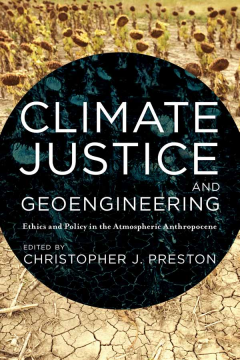
Additional Information
Book Details
Abstract
It is already clear that climate engineering raises numerous troubling ethical issues. The pertinent question yet to be addressed is how the ethical issues raised by climate engineering compare to those raised by alternative proposals for tackling climate change.
This volume is the first to put the ethical issues raised by climate engineering into a comprehensive, comparative context so that the key ethical challenges of these technologies can be better measured against those of alternative climate policies . Addressing the topic specifically through the lens of justice, contributors include both advocates of climate intervention research and its sceptics. The volume includes a helpful blend of the theoretical and the practical, with contributions from authors in philosophy, engineering, public policy, social science, geography, sustainable development studies, economics, and climate studies. This cross-disciplinary collection provides the start of an important and more contextualized “second generation” analysis of climate engineering and the difficult public policy decisions that lie ahead.
Christopher J. Preston is Professor of Philosophy and a Fellow at the Mansfield Center’s Program on Ethics and Public Affairs at the University of Montana.
Contributors:
Christian Baatz, research assistant, Department of Philosophy, Christian-AlbrechtsUniversität, Kiel, Germany; Patrik Baard, doctoral candidate, Royal Institute of Technology, Stockholm, Sweden; Matthew Cotton, Lecturer, Department of Town and Regional Planning, University of Sheffield, UK; Johannes Emmerling, Senior Researcher in Climate Change and Sustainable Development, Fondazione Eni Enrico Mattei, Milan, Italy; Allen Habib, Assistant Professor of Philosophy, University of Calgary, Canada; Joshua Horton, Post-doctoral Research Fellow, Belfer Center for Science and International Affairs, Harvard University, USA; Marion Hourdequin, Associate Professor of Philosophy, Colorado College, USA; Frank Jankunis, doctoral student in philosophy, University of Calgary, Canada; David Keith, Gordon McKay Professor of Applied Physics and Professor of Public Policy, Kennedy School, Harvard University; Teea Kortetmäki, doctoral student, University of Jyväskylä, Finland; Penehuro Fatu Lefale, International Climate and Policy Analyst, Bodeker Scientific, Wellington, New Zealand; Jane Long, retired Principle Director at Large, Lawrence Livermore National Laboratory, Berkeley, USA, and contributing scientist for the Environmental Defence Fund; Duncan McClaren, director of McLaren Environmental Research Consultancy and Scientific Advisory Committee of the RCUK UK Energy Programme; Cush Luwesi Ngozo, Lecturer, Department of Geography, University of Kenyatta, Kenya; Konrad Ott, Professor for Philosophy and Ethics of the Environment, Kiel University, Germany; Andrew Parker, Research Fellow, Institute for Advanced Sustainability Studies, Potsdam, Germany; Tina Sikka, Postdoctoral Fellow and Lecturer, School of Communication, Simon Fraser University, Canada; Toby Svoboda, Assistant Professor of Philosophy, Fairfield University, USA; Massimo Tavoni, Fellow, Center for Advanced Studies in Behavioural Science, Stanford University, and Climate Change and Sustainable Development Deputy Coordinator, Fondazione Eni Enrico Mattei, Milan, Italy; Michael Thompson, Managing Director, Forum for Climate Engineering Assessment, School of International Service, American University, Washington DC, USA; Richard Tol, Professor of the Economics of Climate Change, Institute for Environmental Studies and Department of Spatial Economics in Vrije Universiteit, Netherlands and Professor of Economics, University of Sussex, UK; Per Wikman-Svahn, scientist, Swedish Defence Research Agency, Stockholm, Sweden
Responding to the risks of climate change management requires attention to coupled scientific and ethical concerns. Nowhere is this more obvious than proposals to engineer the climate through measures like cooling the planet through deployment of stratospheric aerosols. Climate Justice and Geoengineering makes an important contribution to this complex and controversial approach to climate risk management, one that promises to responsibly inform both practices and policy.
Nancy Tuana, DuPont/Class of 1949 Professor of Philosophy, Penn State University
Christopher Preston has emerged as a leading philosopher of the ethics of climate engineering. In this new collection of essays, he has brought together a diverse group of thinkers and analysts from across three continents who wrestle with the complex question, ‘In what ways might it be just to deliberately engineer the world’s climate?’ Preston’s Climate Justice and Geoengineering shows that in the Anthropocene the human ability to transform nature will always likely exceed our confidence in whether it is morally right to do so.
Mike Hulme, Professor of Climate and Culture, King’s College London
This important collection situates its thoughtful contributions on climate justice and geoengineering within the context of real-world climate policy choices. It thereby provides a much-needed reflection on the implications of considering geoengineering as a potential policy option amongst others, and is excellent reading for anyone interested in the difficult choices that contemporary climate policy must face.
Stefan Schäfer, Institute for Advanced Sustainability Studies, Potsdam
It is likely that we will all have to grapple with the political and ethical implications of climate engineering as calls for an aerosol sunscreen to coat the Earth become louder. Christopher Preston has brought together an impressive group of thinkers to reflect on the knottiest problem of geoengineering: can it be done justly and, if not, must we do it anyway?
Clive Hamilton, Professor of Public Ethics at Charles Sturt University; author of Earthmasters
Table of Contents
| Section Title | Page | Action | Price |
|---|---|---|---|
| _GoBack | 1 | ||
| _GoBack | 15 | ||
| _GoBack | 63 | ||
| _GoBack | 79 | ||
| _GoBack | 109 | ||
| ddDoi2 | 133 | ||
| ddDoi3 | 133 | ||
| ddDoi | 134 | ||
| ddDoi1 | 134 | ||
| _GoBack | 132 | ||
| _GoBack | 137 | ||
| _GoBack | 175 | ||
| _GoBack | 189 | ||
| _GoBack | 201 |
